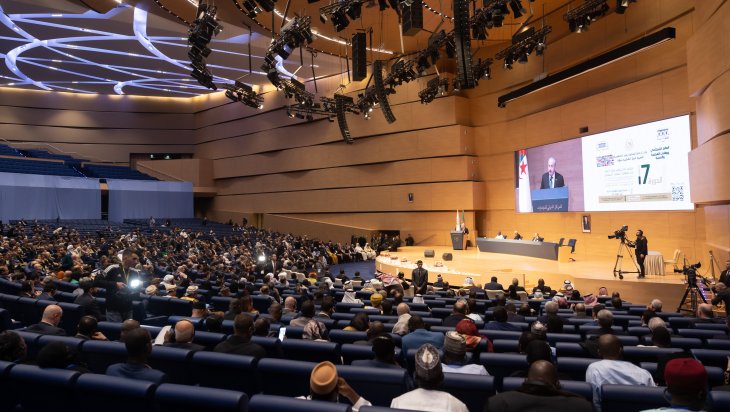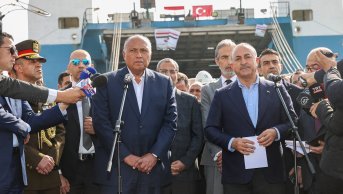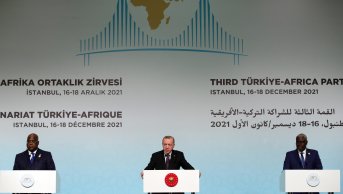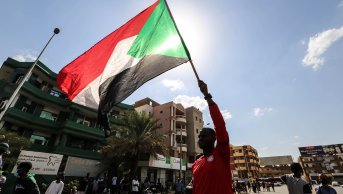Reflections on the 17th Meeting of the Parliamentary Union of the Organization of Islamic Cooperation and the Unifying Role of Algeria and Türkiye

The Parliamentary Union (PUIC), one of the organs of the Organization of Islamic Cooperation, held its latest meeting on January 29-30, in Algeria, one of the North African countries, with the main theme "The Islamic World and the Challenges of Modernity and Development". The meeting, appealing to a broad audience ranging from Asia to Europe, from Africa to the Arab world, and even Latin America is of great importance because it is a rising, mutual call-in relation to the developments and events in the Islamic world with the messages and decisions taken.
The meeting took place in a period where the Muslim world is faced with attacks on Islam globally and regionally, with Israel increasing its unjustified attacks and pressure on Palestine, and where the goal of reaching a consensus on certain issues are felt deeply among Muslim countries. At the summit, which was attended by parliament speakers, deputies, and other high-ranking officials, strategies aimed at protecting the Al-Aqsa Mosque, where Israel has increased its attacks, as well as unity in the fight against all forms of terrorism were discussed. The Organization of Islamic Cooperation Summit that convened in Algeria is actually a sign of Algeria's historical position and responsibilities in Middle East politics, in addition to being a reflection of Algerian foreign policy on fundamental issues.
Mustafa Şentop, the Speaker of the Grand National Assembly of Türkiye, attended the meeting. During Şentop's contacts in Algeria, it was clear that the partnership between Türkiye and Algeria was prioritized. In this framework, Türkiye and Algeria stand out in defending both the Palestinian state and the rights of Palestinians, as well as pointing out the situation in which the Islamic world is on various platforms. The two countries are continuing their initiatives to align their efforts with each other not only on these two foreign policies but also on ensuring peace and stability in the Middle East and Africa. In this context, the Speaker of the Grand National Assembly, Şentop, emphasized the economic potential of Türkiye-Algeria relations and stated that the mutual trade volume between the two countries increased from 4.1 billion dollars in 2021 to 5.3 billion dollars in 2022. Türkiye and Algeria, whose partnership is vital for the region within the framework of Mediterranean geopolitics, also want to strengthen their efforts to reach a consensus in their political relations and attitudes towards regional politics, as well as increase their economic relations. Therefore, this meeting is of vital importance in terms of relations between the two countries.
In this context, the Organization of Islamic Cooperation is one of the platforms that allows Türkiye and Algeria to strengthen their partnership. It can be seen that Türkiye and Algeria have aligned their stances on the defense of Palestinian rights and attacks against Islam, which are among the critical issues that both countries attach importance to in their foreign policy. Within this framework, it should also be remembered that in past periods under Türkiye's presidency of the PUIC, the “Committee on Muslim Communities and Minorities” was established and a comprehensive report was prepared on negative issues such as hate crimes committed against Muslims in the world. In this context, the necessity for Muslim countries to develop a common strategy against attacks on Palestine as well as attacks against Muslims and sacred sites of Islam lately by certain far-right individuals in European countries such as Sweden, Denmark, and France is the main issue emphasized in Algeria. Many officials of both countries, including the top officials, have also made statements implying that the religion of Islam is a religion of tolerance and that such attacks in European countries support terrorist organizations rather than harm the religion of Islam. Therefore, it should be stated here that the stances of Türkiye and Algeria and their statements on related issues reflect a summary of the stances of the Muslim world and were officially shared by the members of the Organization of Islamic Cooperation.
In addition, the PUIC platform has again provided an opportunity for Türkiye and Algeria to strengthen their policies both towards Palestine and the Muslim world. While it has not been a month since the year 2023 was entered, it is reported that the number of Palestinians who have lost their lives by disproportionate attacks of Israeli forces is over thirty. In this context, the fact that Binyamin Netanyahu, who was the Prime Minister of Israel in the past, formed a government again after the fragile and short-term Prime Ministers of Naftali Bennett and Yair Lapid, was also noted as an important development in terms of the politics of the Middle East region. Israel, reported to have established the most conservative and far-right government in its history, has continued to commit human rights violations and attacks on Palestinians using Israeli police and military forces, as well as with their own citizens by facilitating their access to the weapons.
In this context, in the first days of January and the new year, Minister of National Security Itamar Ben Gvir, together with the accompanying police force, organized a raid on the Al-Aqsa Mosque and entered the Harem-i Sharif. After the events, the State of Palestine, Hamas, and the Jerusalem Islamic Foundations Administration stated that the status of the Al-Aqsa Mosque was violated and hinted that the events could escalate. Afterward, Israeli forces attacked the West Bank city of Jenin, killing nine Palestinians in the attack, and after the violence escalated, an Islamic Jihad attack was carried out on a synagogue in Jerusalem.
Attacks targeting all Muslims in Sweden and Denmark and aiming to damage copies of the Holy Qur'an on top of this spiral of violence prove that the assembly of Middle Eastern and Muslim countries in Algeria is an important development. The Summit held in Algeria with all this in the background has given the opportunity to represent Algeria's stance on the Israeli-Palestinian issue to the public opinion of the Middle East and has given rise to the opportunity to align the stances of the participating countries regarding recent developments. During the meeting, President of Algeria, Abdelmadjid Tebboune, stated the need for finding civilized formulas against hostilities towards the Islamic religion. In this context, President Tebboune also added that Algeria will continue to support Palestine.
Algeria is considered to be one of the countries that have not recently joined the trend of normalizing relations with Israel after Egypt and Jordan normalized relations with Israel in 1979 and 1994, respectively. In 2020, the Gulf countries redefined their political relations with Israel, and within this framework, Gulf countries such as the UAE and Bahrain normalized their relations with Israel, as well as Morocco and Sudan. Within this framework, Algeria, along with countries such as Saudi Arabia and Kuwait, is among the countries that have reacted strongly to Israel in the Middle East. Algeria's justified regional stance towards Israel also stems from the fact that it has historically sided with the Palestinians, fought against imperialism and anti-colonialism against France for a long time, and succeeded in the end.
In this context, Algeria is not content with only reacting against Israel and is striving for the coexistence of Palestinian actors. Palestinian Dialogue Talks indeed took place under the mediation of Algeria in October 2022 between Palestinian factions, which included Fatah and Hamas as well. Even though Palestinian factions such as Hamas, Fatah, the Popular Front for the Liberation of Palestine, and the Palestinian National Initiative weren't observed to be cooperating with each other as a result of reconciliation, it is evident that the meeting and the unspoken reconciliation are one of the efforts that could end the political division in Palestine.
As a result, it can be seen that the main topics on the agenda for the 17th Meeting of the PUIC are the attacks against Palestine and Islam. According to the statements of authorities such as the President of the Council of the Nation, Algeria, Salah Goudjil, it was also stated by the authorities that Algeria considers the Palestinian issue to be Algeria's issue and that all Arab countries and Muslim countries should defend the rights of Palestine. In this context, Goudjil stressed that the most fundamental agenda topic of the meeting is Palestine.











